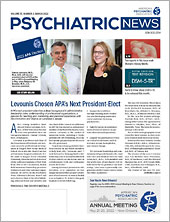APA’s Government, Policy, and Advocacy Update (March 2022)
APA Urges Congress to Expand Access to Telehealth
Organizations Express Concern With Administrative Burden of Good Faith Estimates
Concern Expressed Over FDA Modifications to Clozapine REMS
State Team Works to Limit Prior Authorization, Introduce Collaborative Care
Information & Authors
Information
Published In
History
Keywords
- Advocacy
- Government Relations
- APA DGR
- Policy
- Telehealth
- Public Health Emergency
- COVID-19
- Pandemic
- HHS
- Department of Health and Human Services
- No Surprises Act
- Centers for Medicare and Medicaid Services
- CMS
- Good faith estimate
- Food and Drug Administration
- FDA
- Risk Evaluation and Mitigate Strategies
- REMS
- Clozapine
- Collaborative Care
- Prior Authorization
Authors
Metrics & Citations
Metrics
Citations
Export Citations
If you have the appropriate software installed, you can download article citation data to the citation manager of your choice. Simply select your manager software from the list below and click Download.
For more information or tips please see 'Downloading to a citation manager' in the Help menu.
View Options
View options
Login options
Already a subscriber? Access your subscription through your login credentials or your institution for full access to this article.
Personal login Institutional Login Open Athens loginNot a subscriber?
PsychiatryOnline subscription options offer access to the DSM-5-TR® library, books, journals, CME, and patient resources. This all-in-one virtual library provides psychiatrists and mental health professionals with key resources for diagnosis, treatment, research, and professional development.
Need more help? PsychiatryOnline Customer Service may be reached by emailing [email protected] or by calling 800-368-5777 (in the U.S.) or 703-907-7322 (outside the U.S.).
